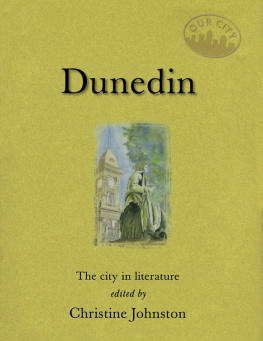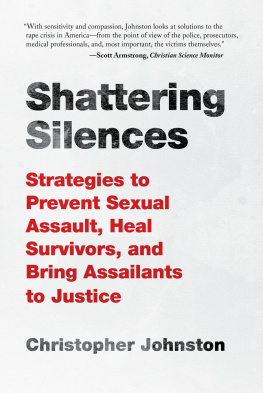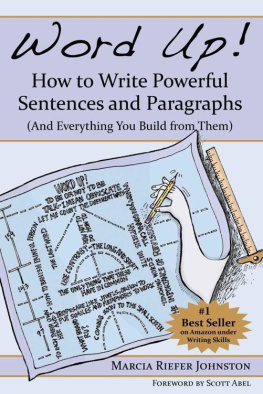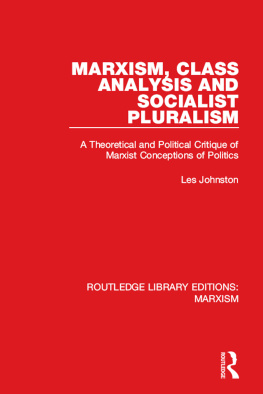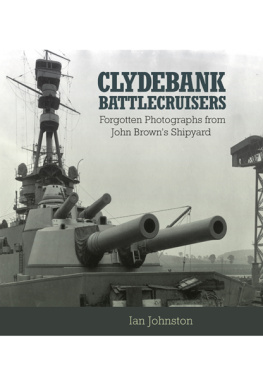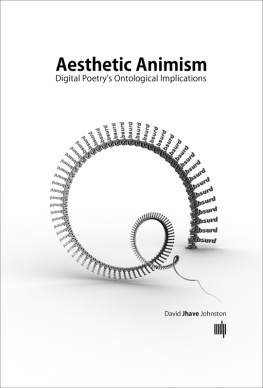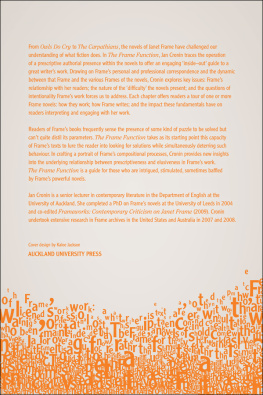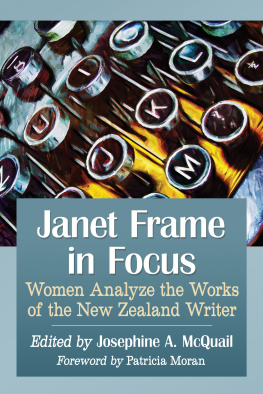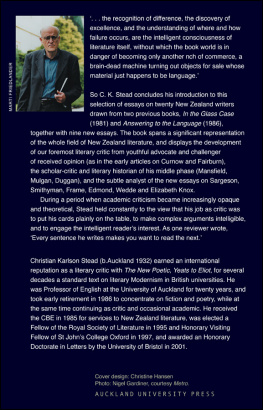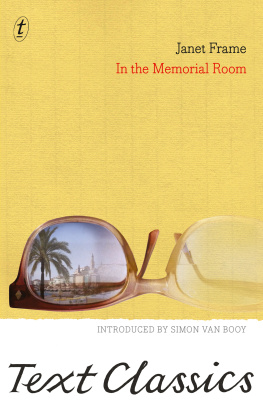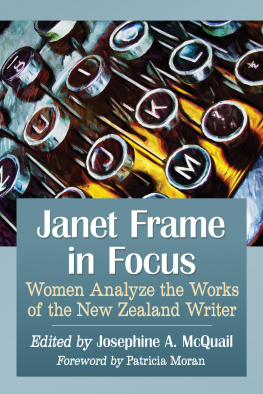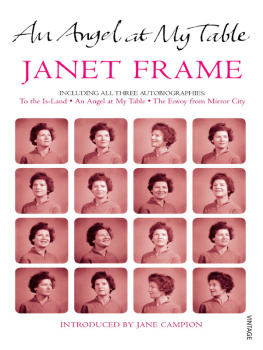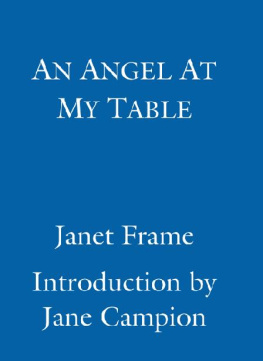A city that boasts a bronze poet ought to cherish its literary tradition. There is powerful symbolism in the brooding presence of Robbie Burns in Dunedins Octagon, although nowadays few bother to read his works. Does he challenge the locals to take up their pens and write? (They are more inclined to take up his pen; his quill has been souvenired repeatedly over the years.) The statue of an eighteenth century Scottish bard in a South Pacific city raises many questions. Why was his statue commissioned over a century ago before they had even sealed the roads? He may be representing nostalgia or Scottish nationalism as much as literature. He may be irrelevant, but he is, nevertheless, revered. Wearing an oversized CanTeen bandanna or varsity scarf, he is a city mascot. If he didnt exist we would have to invent him.
I grew up in Dunedin in the 1950s and 1960s, a fourth generation Dunedinite, but I dont remember being particularly impressed by Robbie Burns. I didnt identify with him; he was too other male, foreign and literally larger than life. (I was perhaps inured to statues. There were any number about town, and I went every Sunday to a church full of marble and plaster saints.)
Robbie Burns certainly didnt inspire me to write; the source of that urge remains mysterious. While some aspects of my education seemed calculated to eradicate urges of any sort, others like the theatre and language of the Catholic liturgy probably encouraged it. It seems a long time ago. The grey post-war Dunedin of my childhood was a different place from the Dunedin of today, a more cosmopolitan, open-minded, youth-oriented and writer-friendly town. Education and tourism are now its principal industries.
For this collection of fiction and memoir I sought out writing that opens windows on Dunedin, on the big picture and the small picture of life as it is lived here. Not surprisingly, given the Celtic bards influence, a few poems have insinuated themselves between the covers, ostensibly to complement, contradict or accompany a piece of prose.
It seemed appropriate to begin what is essentially a twentieth century anthology with an extract from John A. Lees autobiographical novel, ChildrenofthePoor, which has been engaging and shocking readers since 1934. In his dedication (to daughters of the poor [and] errant brats and guttersnipes), Lee (18911982) proclaims his novel to be a story of the gutter. It does not disappoint on that score.
Charles Brasch (190973) by comparison enjoyed a more comfortable childhood surrounded by a loving extended family. However, his mother died before he was five and paternal expectations proved to be a lifelong burden. Brasch, a major poet of his time, is remembered chiefly as the founding editor of Landfall and a pioneering spirit in the evolution of a New Zealand literature. His name keeps cropping up in this anthology in the memoirs of Janet Frame, Ruth Dallas and Alistair Campbell where it is apparent how highly his literary taste was regarded by his contemporaries. The modern reader may marvel that one mans critical judgement held such sway. Brasch would certainly qualify as the godfather of Dunedin writing, Robbie Burns notwithstanding.
Lee and Brasch present, respectively, a tale of the mean streets and an eloquent remembrance of times past. (Its tempting to see here two persistent strands of New Zealand writing it was the best of times, it was the worst of times .) What follows, arranged more or less chronologically according to subject matter, are extracts of fiction and memoir that hold the mirror up to Dunedin, its people and its institutions, its weather and its moods. We visit local landmarks Carisbrook, the Botanical Gardens and the Albatross Colony. We walk in familiar neighbourhoods, each with its own atmosphere in Castle Street with an alter ego of James K. Baxter. Janet Frame takes us to the Andersons Bay Cemetery in unusually benign weather in TheBath, while in her autobiography she walks from the Grand Hotel, where she is working as a waitress, to Royal Terrace to take tea with Charles Brasch. Ruth Dallas writes of harsh winters in North East Valley they burnt half a ton of coal every three weeks in 1957. Corstorphine is home to the young Brian Turner and St Clair the setting for my novel, TheSharkBell. Paula Boocks teenage heroine breaks the house rules to drive at night to the Signal Hill Monument. Similarly, a bike ride to view the city lights offers a promise of intimacy in the extract from Emma Neales novel. The University of Otago, at once fostering the life of the mind and encouraging the sowing of wild oats, provokes rebellion and humour; Owen Marshall and Paddy Richardson cock a snook at its basalt and limestone towers. And Ed, Duncan Sarkies pre-teen, runs up the Bullock Track, up Highgate and over the Stuart Street Bridge to escape domestic warfare.
Dunedins natural beauty its harbour and peninsula, its green belt and ocean beaches provides the backdrop to unfolding human dramas. The waves roll in at St Clair and St Kilda and clouds gather about Mt Cargill. In a city with the salt wind in its face (or at its back) the hinterland exerts a strong attraction. There the mountains, lakes and rivers beckon an antidote to grey skies and moist airs.
Many of the contributors to this anthology are well-known New Zealand writers. Janet Frame has achieved an international reputation but remains identified with Otago. Charles Brasch, James K. Baxter, Ruth Dallas, Cilla McQueen and Brian Turner are acclaimed poets who are closely associated with Dunedin. Alistair Campbell writes from his perspective as the only coloured boy at Otago Boys High School in the war years. John A. Lee and James K. Baxter could be described as national public figures as well as writers. Owen Marshall and Bernadette Hall have one foot in Otago and one in Canterbury. Emma Neale (born 1969) has already an impressive publishing history and is proving to be a talented writer of prose and poetry. Other contributors have local and burgeoning reputations.
The writing in this anthology spans seventy years. Some of New Zealands most accomplished authors lead the reader through time and space, in a city that is not resistant to change but has managed to remain true to its historical identity. Rug up, dear reader, and enjoy the walk.
Christine Johnston
JOHN A. LEE
The Tragic Sinners
T his is the story of how I became a thief, and in time very much of an outlaw, running and skulking from the police. And this story may throw light upon the circumstances that made my sister a daughter of the streets, a poorly remunerated and therefore despised member of that oldest profession, which is not unlike any other calling in that its practitioners are honoured or despised according to the quantity rather than the source of their earnings.

